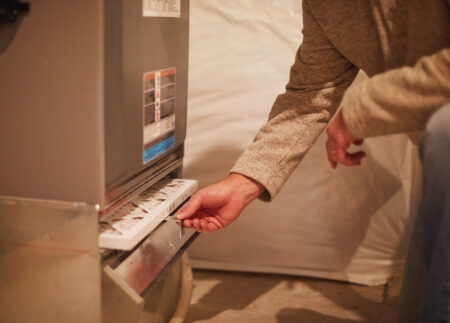Everything has an expiration date. Your reliable furnace, which has served you well for many years and keeps your home warm and cozy during the cold winter months, is no exception. You can only try to extend its life as much as possible while watching out for signs that it may be nearing its end. Here’s a guide to help you understand the lifespan of a furnace and what you can do to make it last longer.
Types of Furnaces and Their Lifespan
Gas Furnaces
On average, a gas furnace can last around 15 years. However, if you invest in regular maintenance and tune-ups, your system can double its life expectancy. If you go beyond 30 years, the repair costs and energy bills may become more expensive than simply purchasing a new furnace.
Oil Furnaces
Oil furnaces use fuel oil to heat your home and are especially popular in colder climates due to their ability to produce high levels of heat. With proper care, this system can keep your home warm and cozy for up to 20 years.
Electric Furnaces
Electric furnaces have a longer lifespan than all the other types, with an average of 20-30 years. This is because they have fewer mechanical parts and operate at a lower risk of breakdowns. However, they may have higher energy costs in the long run.
Propane Furnaces
Many folks choose propane furnaces because they burn cleaner and save on energy costs. They provide more radiant heat than gas furnaces; however, their lifespan is about the same—around 15 years.
Factors Influencing Furnace Lifespan
Quality of Installation
A well-installed furnace will last longer than one that’s not. That’s because it will run smoothly, without any strain or added stress on the system.
Quality installation means proper duct sizing, secure gas line connections, electrical wiring, flue venting, and correct furnace sizing for your home. Ensure that you hire a licensed and experienced HVAC technician for this job.
Usage and Load
How often you use your furnace and the demand placed on it can impact its longevity. A furnace that runs continuously during the winter months will experience more wear and tear compared to one that’s used sparingly.
While there is no avoiding the need for a furnace during the winter, you can take steps to reduce its load. For example, ensuring proper insulation in your home will help to retain heat and reduce the need for constant heating.
Equipment Quality
When shopping around for a furnace, you may have noticed that there is a wide range of prices and features available. Although a cheaper option might be appealing, remember that the quality of the equipment significantly affects its durability.
Investing in a high-quality furnace may cost more upfront, but it can save you money in the long run by lasting longer and requiring less maintenance. Consider reputable brands, materials, and energy efficiency ratings when making your decision. Your contractor should guide you in selecting the best option for your home.
Maintenance and Care
Regular maintenance can really make a difference in how long your furnace lasts. Annual check-ups by a professional can identify and address minor issues before they become major problems.
Also, simple tasks like changing filters, cleaning ducts, and inspecting components can go a long way in keeping your furnace functioning properly. Your contractor can provide you with a schedule for these tasks and demonstrate how to perform them correctly.
Environmental Factors
The environment in which your furnace operates can also affect its longevity. For starters, if the area in which you installed your furnace is crowded or poorly ventilated, it can cause the equipment to work harder and wear out faster. Both the outdoor and indoor unit needs fresh air intakes to ensure proper airflow and prevent overheating.
In addition, humidity levels can also play a role. If the air in your home is too dry, it can cause components to become brittle and break more easily. On the other hand, excessive moisture can lead to corrosion and damage.
Signs Your Furnace Needs Replacement
Frequent Repairs
Frequent repair calls indicate that your furnace is nearing the end of its lifespan. This is often the first sign that your furnace can no longer operate properly and efficiently. Continuing to pour money into repairs may end up costing you more in the long run than investing in a new furnace.
Increased Energy Bills
Having a budget for your home’s utilities is really important. When you know what your energy bills usually look like, you can easily spot if something seems off. For instance, a sudden spike in your energy bills can be a sign that one of your appliances or the electrical system is not functioning properly. If your furnace is the issue, it might be time to think about upgrading to a newer model with better performance and energy efficiency.
Inconsistent Heating
If you notice that some areas of your home are warm and others are cold, this could be a sign that your furnace is struggling to distribute heat evenly. First, check your air filters or vents to make sure they are not blocked. If the issue keeps happening, it might mean your furnace is getting old and needs to be replaced.
Unusual Noises
A furnace is a comfort system meant to provide consistent warmth without loud or unusual noises. If you begin to hear strange or excessively loud sounds coming from it, then it could be a sign that something is seriously wrong.
For example, if you hear a rattling noise, it means something inside the furnace is loose and moving around, bumping into other parts. A screeching or whining noise could indicate a problem with the blower motor, which is responsible for circulating air throughout your home. Grinding sounds could be coming from worn-out bearings, which are responsible for keeping the motor running smoothly.
Repairs can address some noises, but persistent or severe sounds might indicate it’s time for a replacement. Consult a professional HVAC technician to determine the best course of action.
Strange Odors
Furnaces should also not produce any strange odors. If you start to smell something burning, it could mean that there is a problem with the furnace’s electrical wiring or motor. A musty or moldy smell could indicate a buildup of moisture in the system, which can lead to mold growth and potential health hazards. A rotten egg smell could be a sign of a gas leak, which is extremely dangerous and requires immediate attention from a professional.
If you notice any unusual or concerning odors coming from your furnace, turn it off immediately and call an HVAC technician for assistance. Ignoring strange smells can lead to further damage and potentially hazardous situations.
Pilot Light Issues
If you have a gas furnace, you should regularly check the pilot light to ensure it is lit and burning a steady blue flame. If the flame is yellow or flickering, it could be a sign of a gas mixture issue that requires adjustment. A constantly extinguishing pilot light could indicate a problem with the thermocouple, which controls the gas flow in the system.
You should leave this problem for a professional to handle, as gas leaks can be dangerous. Regularly checking and maintaining the pilot light can prevent any potential issues from escalating.
Old Age
Finally, if your furnace is nearing or has surpassed its expected lifespan, it’s wise to start planning for a replacement. Even if it’s still working, the likelihood of breakdowns and efficiency issues increases as the furnace ages.
Call Mighty Pine Heating & Air for All Your Furnace Needs
Your furnace is essential to your home, and keeping it in top shape ensures your family’s comfort and safety. If you’re in Wheat Ridge, call Mighty Pine Heating & Air to help with all your furnace needs. Whether it’s installation, repair, or maintenance, our team of experts is ready to assist. We also offer electrical panel upgrades, EV charging station installation, indoor air quality solutions, and AC repair, maintenance, and installation. Contact us today to learn more about how we can help keep your home comfortable all year round.



